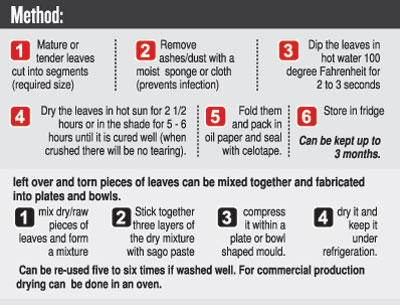Old and new ideas help to shove polythene further into exile
More individual and private initiatives continue to see the light of day in the wake of the September ban on polythene in the country.
But at the same time, a type of bag handed out by some supermarkets, has been declared non-compliant by the environmental regulator.Housewives are making fabric bags, small vendors are making paper bags by themselves as in the days gone by before the polythene menace took hold, and the banana leaf has got a new lease of life with ways found to store them.
The Central Environmental Authority’s director general of solid waste management, J M U Indraratne, said that the shopping bags are not made of light density polyethylene but a mixture of 75% high density and 25% low density polyethylene.
Indraratne said that supermarkets including Keels, Arpico, Laugfs, Ranjanas, and Sathosa, have been told that the bags do not conform to CEA specifications on compostability and biodegradability.
While agreeing to the ruling, the supermarkets have asked for time to use up existing stock of polythene bags.
The CEA said that the polythene ban will not come into effect until January 1, 2018.
At the Panagoda base, the Sri Lanka Army has started to use banana leaves in the mess instead of the lunch sheets.
Budded banana plants are being propagated on land that belongs to the army. A budded banana plant is said to mature in four months. Arrangements are being made to take the idea to Diyatalawa, Mullaitivu, Kandakadu, Kottigala, Kantale, Ekala, and Ambalangoda.
The banana leaves are cured and kept under refrigeration for a minimum of three months.
The agricultural directorate of the army said that cured banana leaf is used by about 95,000 soldiers at Panagoda.
Major Thushara Perera, said that there are plans to produce banana leaves on a commercial scale.
Meanwhile, a private company manufacturing environmentally-friendly bags has made a starch bag.
Already a leading supermarket is selling them for Rs 1.50 each. The cost is Rs 2.50, the company says. According to the company, the bags had been certified by Belgium’s Vincotte Belgie, a testing company. It is not known what it was tested for.
Also the same company is selling, what it claims to be are, bio-degradable and compostable lunch sheets at Rs 2.60 each. The supermarkets are selling lunch sheets at Rs. 360 for 100 sheets.
A senior researcher from the National Institute of Fundamental Studies, said that manufacturers of polythene should find new materials that are compostable and biodegradable.
Dr Gamini Seneviratne, said there are alternatives including starch and cellulose material.

